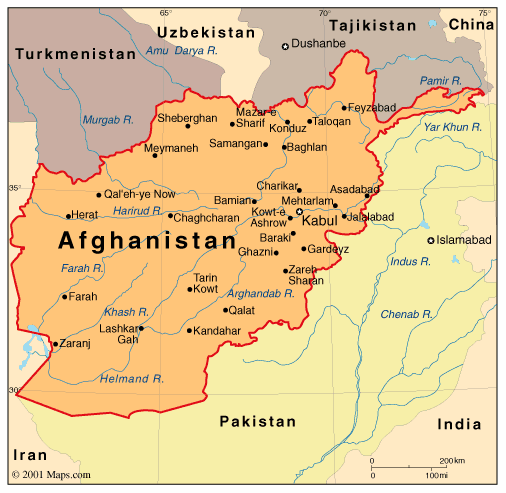
President Barack Obama is reconsidering his Afghanistan strategy. If he decides to continue on his dead end course of muddling through, Germany can and should start planning to withdraw its troops.
The argument in favor of German military engagement in Afghanistan has three policy aspects: moral, security and military alliance. People love talking most about the moral aspect and about the security aspect only when they must. The subject of military alliances is hardly ever mentioned publicly in Germany when it comes to our participation in Afghanistan.
What our leading partner, the USA, decides to do there will determine what Germany is asked to do there as well. Before we begin arguing whether Germany should or should not continue its engagement there, we need to take a good, hard look at Washington. Barack Obama is obviously contemplating a gradual withdrawal from the conflict.
As long as Afghanistan was relatively safe for German military forces, we explained our participation mainly in moral terms: building schools, strengthening women’s rights, furthering democracy. It was for these noble goals that German soldiers had to go to Kabul and Kundus. Meanwhile, it has become obvious that this explanation is not good enough. First of all, the war has become increasingly bloody. Democracy building can only succeed if it can oppose its enemies with force. Secondly, one must ask why Germany is fighting for democracy and human rights exclusively in Afghanistan.
The answer to that is, of course, security policy: Afghanistan under Taliban rule was al-Qaeda’s home base. Depriving these terrorists of a headquarters remains the main objective of the international force in Afghanistan.
But it was also about military alliance policy. Immediately after 9/11, then-Chancellor Gerhard Schröder assured the United States “unlimited solidarity.” And during the trans-Atlantic wrangling over the Iraq war, Germany’s presence in Afghanistan was held up as proof of Germany’s commitment to fighting the war on terror. Bush opponents were convinced that the Iraq war was unnecessary and wrong, but the war in Afghanistan was necessary and right.
The more losses NATO partners suffered in Afghanistan’s dangerous southern regions the more important solidarity in military alliances became. When allies are dying, Germany cannot very well duck out the back door, especially since the German army is providing logistical and military assistance to its partners.
What happens next in Afghanistan is entirely dependent on Barack Obama’s decision, and he is considering the big picture. His military commanders on the ground are asking for more troops for a counter-insurgency strategy like the one successfully employed in Iraq: instead of hunkering down on large installations from which troops emerge to pursue the Taliban, smaller units are to live among the people in order to protect them. In this way, trust can be built among the population and regions made safer.
But the price for such a strategy is high: more troops who – at least in the beginning – will be exposed to far greater risk. The German army has already indirectly experienced the effects of those risks. The air attack on the hijacked fuel transport convoy requested by a German officer that resulted in the deaths of more than 50 Afghan civilians was criticized sharply by the United States. In the new logic of the “counterinsurgency” there are to be no victims among the civilian population – even if protecting them endangers ones own troops.
Up to now, Obama has hesitated to approve a troop surge. The reasons for that are obvious: the president is under fire at home, the economy continues to stagnate, public debt continues to pile up and his pet project, healthcare reform, is teetering on the edge of failure. He can therefore not afford to alienate those in his own party who oppose the Afghanistan war with increasing volume and are calling for withdrawal.
Obama said, “I’m not interested in just being in Afghanistan for the sake of being in Afghanistan or saving face or . . . sending a message that America is here for the duration.” He intends to look carefully at the entire picture, he said.
Germany should look carefully at the direction in which Obama is moving. If he chooses the systematic “counterinsurgency strategy,” new missions and increased dangers are in store for the German military, and those need to be publicly discussed.
If, on the other hand, Obama decides to continue on with his ineffectual policy of muddling through, a course based solely on future withdrawal, then Germany needs to begin reducing its participation now. Nothing significant can be accomplished; there is no reason to commit the German army to fighting a protracted and bloody rear guard action.
A columnist in the usually Obama-friendly New York Times recently wrote that America was broke and tired of war. If he intends to continue fighting in Afghanistan, he needs to issue a “call to arms” to the American people and that call needs to take priority over everything, even healthcare reform. If he does so and doubt later arises over the war he has his ready-made answer: he will naturally abandon the war rather than his reform plans.
Obama met with NATO General Secretary Anders Fogh Rasmussen on Tuesday. Berlin, however, should not put much faith in what was said there. The Obama administration already has a record of leaving its allies out in the cold. Regardless of what we may think about Obama’s decision to abandon the Eastern European missile defense shield, the manner in which it was done was ham-handed in the extreme. The governments of Poland and the Czech Republic got a phone call in the middle of the night informing them that Washington had changed its mind.

Leave a Reply
You must be logged in to post a comment.